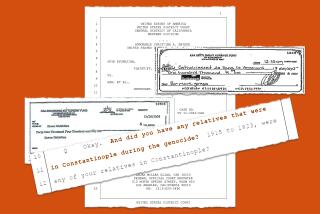Artemis to Pay in Executive Life Case
- Share via
A federal judge Tuesday ordered Artemis, a French luxury goods retailer, to pay $190 million for fraudulently acquiring assets from Executive Life Insurance Co. as the marathon legal battle over the once-highflying insurer wound down.
California Insurance Commissioner John Garamendi, who seized the foundering company in 1991 to protect its 330,000 policyholders, lauded the ruling for sending a firm message that “you cannot profit from a fraud.”
But policyholders, claiming that they lost as much as $4.5 billion in the Executive Life meltdown, denounced the insurance commissioner for pursuing a faulty case that left them with little hope of recovering the full value of annuities they had purchased. One group of policyholders, the Executive Life Action Network, is asking California Atty. Gen. Bill Lockyer to probe Garamendi’s handling of the case.
“What we will receive will be insignificant,” said Vince Watson of Phoenix, whose daughter, Katie, is getting about half the monthly stipend needed to pay for full-time nursing care
In July, U.S. District Court Judge A. Howard Matz in Los Angeles overturned a $700-million punitive damage award issued by a jury that found Paris-based Artemis guilty of misleading regulators when it bought the Executive Life high-risk “junk bonds” during a weak market in the early 1990s.
Artemis, then controlled by French billionaire Francois Pinault, was part of a French investor group that included government-controlled Credit Lyonnais, and the acquisition violated California law that prohibits foreign government entities from owning insurance companies in the state, Garamendi alleged in his lawsuit.
Pinault and the other French defendants reaped $1.7 billion in profit, Garamendi said. However, the jury absolved Pinault of wrongdoing.
Matz on Tuesday opted to order Artemis to pay restitution for about 15% of the $1.29 billion that Garamendi requested.
“The jurors believed that Artemis deserved to be punished for something. I agree,” Matz wrote. “Artemis was not some innocent enterprise that Francois Pinault created as a vehicle to test his self-professed ‘gut feeling’ that rosy business prospects in the United States warranted a multibillion-dollar risk.”
But in strong language, the judge noted that the months-long trial “appeared to be about money, and only about money” and was “almost entirely devoid of any overarching public policy considerations.”
Garamendi’s case, Matz stressed, failed to prove that Artemis actually harmed the Executive Life estate, although Artemis may have misled regulators by its purchase of Executive Life’s bond portfolio and its insurance book of business from other French investors.
According to Matz, Garamendi probably will recover close to $900 million plus interest from the 6-year-long Executive Life litigation. About $700 million previously had been set aside as part of settlements with French bank Credit Lyonnais and other French defendants.
But much of those funds might not wind up in policyholders’ pockets, the judge said, because Garamendi had agreed to “turn over substantial portions” to his lawyers and other parties.
James Clark, an attorney for Artemis, said his client was pleased that the judge indicated that Artemis “was not guilty of fraud.”
He said Artemis could live with the $190-million restitution because it had already paid Garamendi $110 million and had placed an additional $75 million in escrow.
For his part, Garamendi said he was considering whether to appeal Matz’s decision to throw out the July 21 punitive damages award.
More to Read
Inside the business of entertainment
The Wide Shot brings you news, analysis and insights on everything from streaming wars to production — and what it all means for the future.
You may occasionally receive promotional content from the Los Angeles Times.











